| |
|
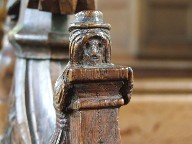 |
|
This charming church is set
at a bend in the busy A1120 road, which
threads its unfortunate way through what
is otherwise a pretty village. There is a
village green and a fine pub, although
the famous Earl Soham Brewery now brews
its excellent beer at the bottom of my
road in Ipswich. The tall west tower
faces the road, the wings of the church
folded in behind it and set in what is a
deceptively sylvan churchyard. There are
no aisles. The best towers in East Anglia
are late 15th Century, and this is one of
them. You can even make out the
inscriptions naming the donor and the
mason high up on the west buttresses. St
Mary underwent a late and theologically
articulate High Church restoration in the
last years of the 19th Century under the
watchful eye of Richard Abbay, who was
Rector here for almost half a century.
Abbay was a creative and energetic man,
and every part of this church shows his
impress. His is the inscription on the
south porch, a modern translation of a
medieval invocation, Christ who died
upon the rood, grant us grace our end be
good. The medieval figure on the
porch pinnacle was probably set here by
him - Mortlock thought it might be St
Andrew.
|
The
nave was rebuilt at about the same time as the
tower in the 15th Century, and has an excellent
contemporary double-hammer beam roof, unusual in
what is a relatively small church. The font is
probably contemporary with the rebuilding of the
nave, although the general feel is of a well-kept
late Victorian church.
Many
of the benches are, in fact, medieval in origin,
but in most cases completely restored. The bench
ends were mostly produced in the early 20th
century under Richard Abbay's direction by a
group of parishioners taught by Archdeacon
Darling, the woodworking Rector of Eyke. As at
other churches where such things are found -
Worthham and Hollesley spring to mind - they are
a delightful collection, giving an insight into
the imaginations and interests of Earl Sohamers
of a century ago. An old woman binds a stook of
corn and a man carries a basket from the Labours
of the Months, and there are a number of other
rural subjects. An old man sits in a big coat and
a bowler hat, perhaps in the snug of the local
pub. Some are animals, some copies of more famous
medieval bench ends at Blythburgh and Ixworth
Thorpe. It must be said that some are rendered
with more enthusiasm than skill, but they are all
the more charming for that. A few are genuinely
medieval.
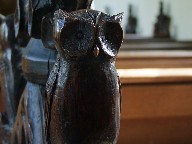 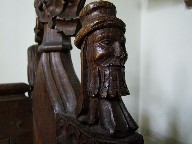
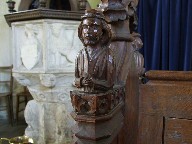 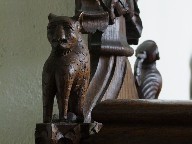
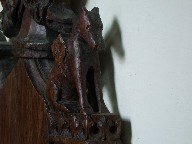 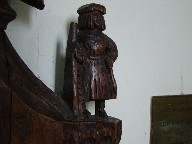 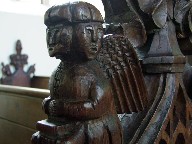
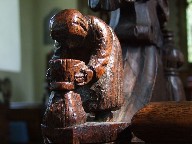
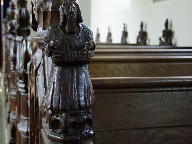
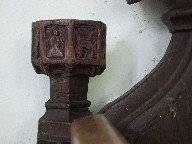 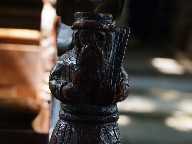

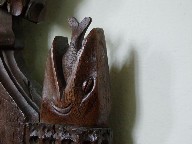 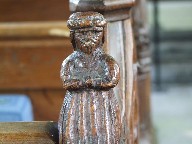  
The
real star of the show at Earl Soham also concerns
Richard Abbay, but post-dates the bench ends by
half a century. This is a window, one of the very
last commissions of the great Margaret Edith
Rope. In 1967, she produced the figures of St
Edmund and St Felix, Suffolk's two major early
medieval Saints, to commemorate the lives of
Canon Abbay and his wife Janet, as well as to
remember their grandson who was killed in the
Second World War at the age of 25. The lines are
fresh and young, the colours vivid and vibrant,
and it is extraordinary to think that Margaret
Edith Rope was already in her late seventies at
the time she produced it. I found it very moving,
not least because, quite by coincidence, I had
the previous afternoon visited Clippesby church
in Norfolk, where one of her very first
commissions, of 1919, is set. And yet here still
were the youthful details, the East Anglian
flowers she loved, the near-comic book joy in the
face of Christ in Majesty in the top light.
Breathtaking.
 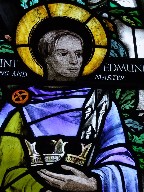  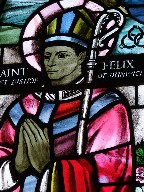 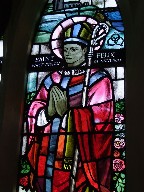
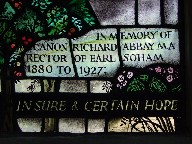 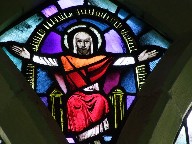 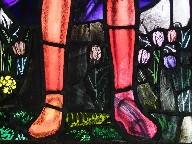 
The
freshness of Margaret Edith Rope's window lends
something of a ponderous feel to the church's
other major window, by Burlison and Grylls
beneath the tower. The main subject is the Host
of Angels appearing to the shepherds, but the
real delight is the pair of vignettes beneath,
one showing Christ healing the High Priest's ear,
an unusual subject, and the other a splendid,
stately Noah's Ark breasting the waves as Noah
releases a dove. The crucifixion, slightly
earlier glass in the east window, is poor in
comparison.
| The royal arms are to
Charles II, set here at the time of the
Restoration in celebration of the end of
the Commonwealth. Even so, this was
perhaps not entirely celebrated here in
puritan Suffolk. To
finish, two reminders of Britain's
colonial role in India face each other
across the nave. Charlotte Colvin was the
wife of Sir Auckland Colvin of the Indian
Civil Service. She died in 1865 at the
age of 28 at Roorkee in the North
West Provinces of India. Meanwhile,
a charming Art Nouveau lead and pewter
memorial recalls a Captain in the 87th
Punjabi Regiment killed half a century
later. He was Marmaduke John Norman
Abbay, the son of Richard and Janet
Abbay. He died in France on May 10th
1915 from wounds received at Ypres.
he was 29 years old. The memorial, almost
certainly designed by Richard Abbay,
records that he Gave his Life for his
Country, his Soul to God. That must
have been small comfort, even then.
|
|
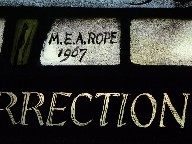 |
|
|
|

